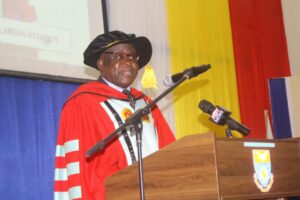Ghana’s environmental devastation can be resolved through time-tested religious practices – Prof Awuah-Nyamekye

Professor Samuel Awuah-Nyamekye, the immediate past Head of the Department of Religion and Human Values, University of Cape Coast (UCC), has made a strong case for the adoption of religious ecological practices to protect the environment.
He argued that Ghana’s “self-inflicted” environmental destruction could only be resolved with the time-tested practices and mechanisms by the various religions, which had conserved the environment for decades.
He, therefore, urged the Government to consult religious organisations and incorporate their inputs, which were mostly science-driven policies, to deal with the menace.
“The secular means have not been able to resolve the issue; the legislations and policies have failed to resolve the problem of environmental destruction, and so we have to turn to religion and environmental ethics,” he said.
Prof Awuah-Nyamekye was delivering his professorial inaugural lecture on the topic: “The Nexus between Religion and Environment: Matters Arising.”
Establishing the relationship between religion and environment through various academic citations and practical examples, he maintained that the war against ecological onslaught could not be won without religion.
He recounted how traditional believers, for instance, protected the ecosystem by revering lands and rivers, which they saw as gods and goddesses, maintained sacred groves and totems, and instituted sacred days.
He, however, noted with worry the recent disregard for indigenous African traditional practices rooted in environmental consciousness and preservation, a situation he attributed to civilisation.
Christianity had had a terrible impact on the indigenous ways of conserving the environment because the missionaries demonised the traditional mechanisms of protecting the environment, he observed.
However, he was quick to add that the situation was gradually changing because some churches were revising their theology to accept some of the indigenous ways of conserving nature.
Citing a Ghana News Agency (GNA) report, he noted that the original forest cover of Ghana formed about 36 per cent of the land but reduced to 23 per cent in 1972, shrank further to 13.3 per cent in 1990, before dwindling to 10.2 per cent in 2010.
“And so, you can imagine the situation now,” he stated.
Prof Awuah-Nyamekye made Biblical and Quranic allusions to support his argument, saying; “Anything you add religion to will succeed”.
Religion should inculcate a sense of environmental consciousness in the youth to understand the need to conserve the environment from the scratch, he said.
“Measures should be put in place to integrate religious environmentalism and its closest field, environmental ethics, in our educational curriculum for the youth to appreciate the need to observe nature.”
“When we heal the environment, we heal ourselves,” Prof Awuah Nyamekye said, adding that “preaching about God without reference to the wellbeing of the environment is a disservice to God and humanity and anything short of this is ungodly.”
He, thus, charged pastors and imams to devote some preaching time to sensitise their congregation on environmental preservation at least once a week.
“I believe that this can go a long way to affect the environment positively. To me, the impact of this will be far greater than the annual week declared by some religious organisations to do environmental cleaning.”
He admonished the various faiths to liaise and discuss how they could conserve the environment in a sustainable manner than look down on each other’s efforts.
Prof Awuah-Nyamekye was appointed as an Assistant Lecturer in 2003 at the Department of Religion and Human Values, UCC and upgraded to Lecturer in 2005.
He was promoted to Senior Lecturer in 2010, Associate Professor in 2014 and elevated to Professor in 2019.
His expertise includes environmental ethics, religion and development, religion and medicine and politics.
The Professor has written and published two books and co-edited two others, done one book review and two encyclopaedia entries.
He has written 23 articles in internationally esteemed scholarly journals, 15 book chapters among other achievements.
He has served in many capacities in his line of duty and is the immediate past Head of Department.
Source: GNA
